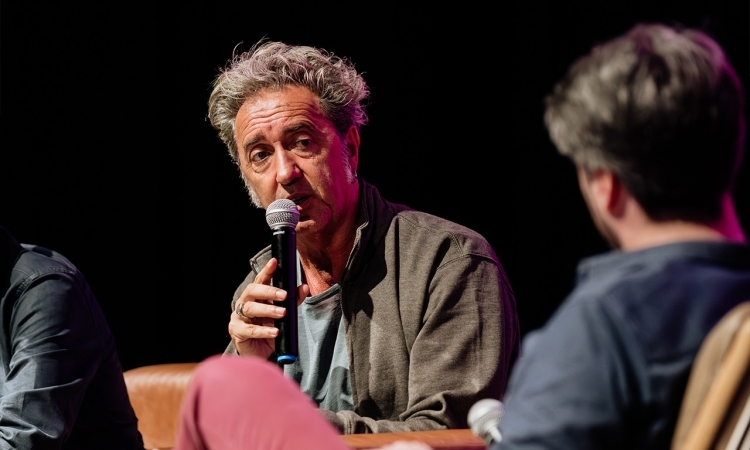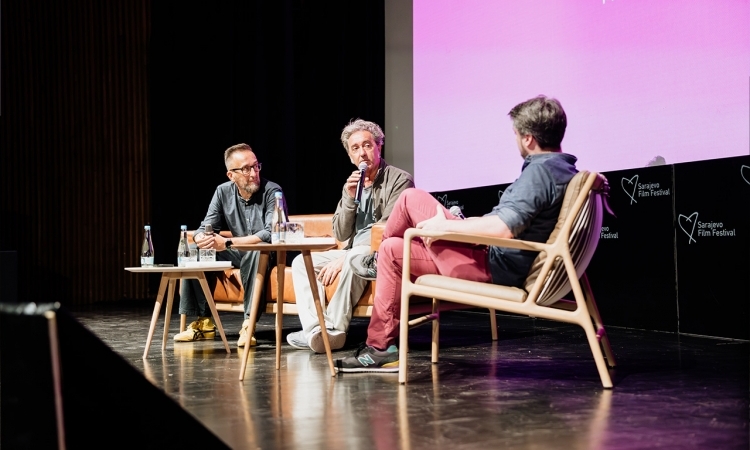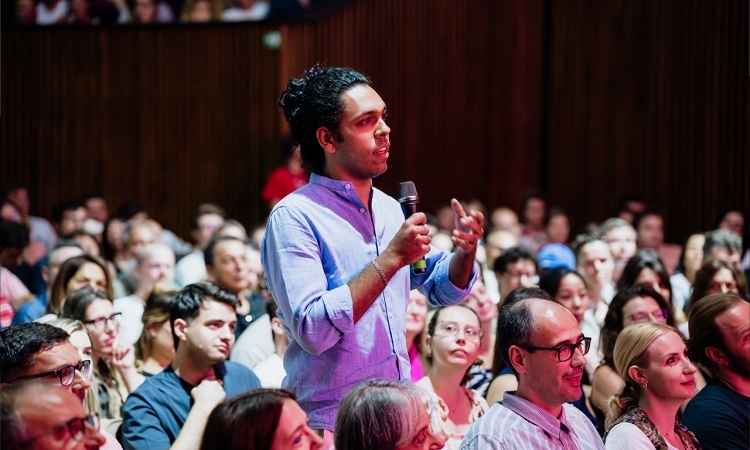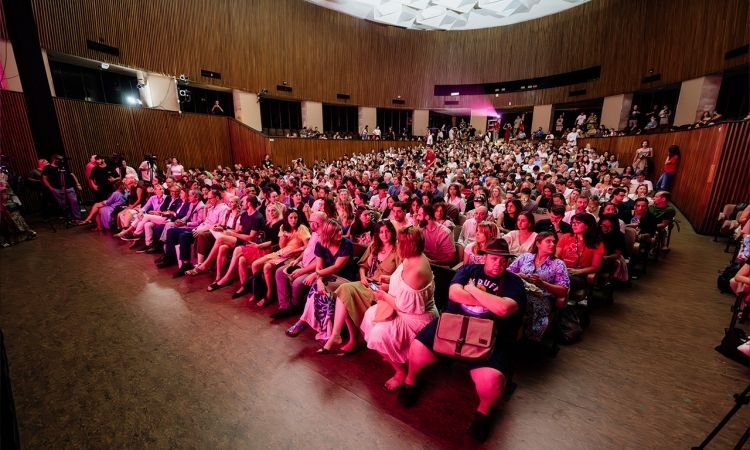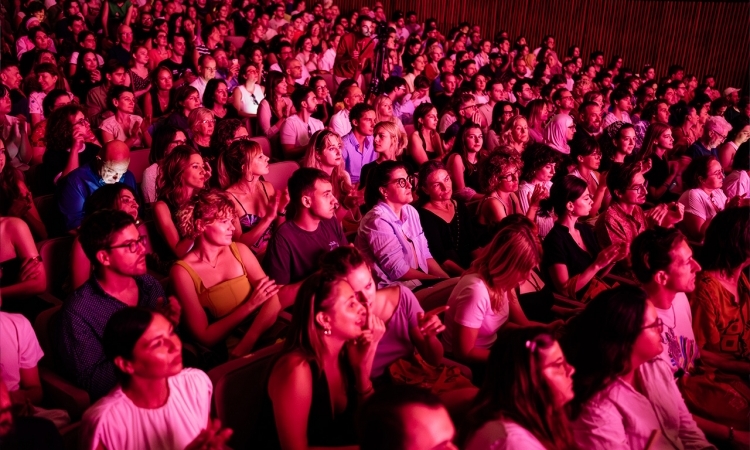Objave
Paolo Sorrentino: A Film Must Be Imperfect, Just Like Life
Recipient of the Honorary Heart of Sarajevo, Italian director Paolo Sorrentino, held a Masterclass at the 31st Sarajevo Film Festival, where he revealed how his acclaimed films come to life, and why he shoots so quickly: he just wants to go home
Recipient of the Honorary Heart of Sarajevo, Italian director Paolo Sorrentino, held a Masterclass at the 31st Sarajevo Film Festival, where he revealed how his acclaimed films come to life, and why he shoots so quickly: he just wants to go home
“It’s fun for me to make films, but not so much to talk about them,” said Italian director Paolo Sorrentino, this year’s recipient of the Honorary Heart of Sarajevo, at the start of his Masterclass at the 31st Sarajevo Film Festival. For festival guests, young filmmakers, and the audience who packed the Bosnian Cultural Center, that might have seemed like a warning of an unexciting 90 minutes ahead. Yet, much like in his films, Sorrentino proved to be witty, candid, and perceptive.
“My films are about emotions, not zombies or other disasters. They portray people, their struggles, their inner worlds. How do you bring that to the screen? Cinema is great for that, because you have a whole set of tricks at your disposal: music, actors, light, the camera… You can, like a magician, create an illusion. But a magician isn’t doing anything truly magical; he’s just using tricks. Filmmakers are the same. The challenge is that you can’t learn those tricks from a book, you have to know them, you have to feel them,” Sorrentino revealed, sharing the approach that has won over cinephiles around the world.
Born in Naples, Sorrentino made his mark with his very first feature, One Man Up (2001), which entered the Competition at the Venice International Film Festival. This was followed by a string of acclaimed films such as The Family Friend and This Must Be the Place, both screened in Cannes, as well as The Great Beauty, which earned him an Oscar®, Golden Globe, and BAFTA for Best Foreign Language Film, along with three European Film Awards.
He won praise from both critics and audiences for Youth, Loro, and The Hand of God, as well as for his TV series The Young Pope and The New Pope. His most recent film, Parthenope, premiered in the Main Competition at the Cannes Film Festival.
And yet, as the director himself admits, this dazzling journey began with depression and laziness.
“When I was 18, I was depressed at home, completely unmotivated. I didn’t know what to do with myself. But I was watching a lot of films, so I thought - this is a job where you can work while actually doing nothing. I went to a bookstore and bought two books: one on how to write a screenplay, and another on how to make a film. I realized I was right,” Paolo Sorrentino told moderator, director Ognjen Glavonić, when asked how he first became interested in cinema. He added that he only truly decided to become a director once he felt he wasn’t earning enough as a screenwriter.
Still, it wasn’t all that simple.
“I quickly realized that you don’t need any special talent to make a film. But it took me years to understand that to make a good film, you need a broad perspective and real knowledge of certain things,” the Italian director emphasized.
When speaking about how his films come to life, he explained that they always begin with people. He becomes intrigued by a character, often a blend of three or four people he knows in real life, and then starts exploring the situations that character might find themselves in. The film’s visual identity, he added, takes shape later, during location scouting and in conversations with his director of photography.
“I don’t interfere too much with the work of the cinematographer. I just tell them how I feel about the film. I describe everything: the story, the characters, what I want from the film, and then they’re smart enough to know what I need. That conversation takes about ten minutes,” Paolo Sorrentino explained.
Above all, the director values speed on set. And for that, he has a very practical reason: he doesn’t like being on set.
“I shoot quickly because I can’t wait to go home. That’s why I often use two or three cameras, so I usually wrap filming two or three days ahead of schedule. Producers love me because I save them money — but really, I just want to go home and watch football,” Sorrentino said with a laugh, describing his filmmaking process.
“My problem is that I don’t really love cinema all that much. I love books, music, football… not so much films. Certain scenes mean a lot to me, but dedicating two hours of my life to a movie feels excessive. Just like songs shouldn’t last longer than three minutes, films shouldn’t be too long either.”
And of course, much like his films, the conversation with Sorrentino couldn’t pass without touching on his hometown, football, and the great Diego Armando Maradona, who, while Sorrentino was growing up, reached divine status in Naples.
“Football in Naples wasn’t important to me, Maradona was. That’s when I first understood what a show really is. Until then, I didn’t know what a grand spectacle looked like, and Maradona showed us. In film, I got the chance to express that kind of spectacle,” Sorrentino said, describing his fascination with Maradona, which he later captured in the acclaimed film The Hand of God.
Speaking about his other works, he admitted that his favorite film of his own is Il Divo, while among other directors, he singled out Federico Fellini’s cult classic 8½.
“Fellini’s film is brilliant because it’s not perfect. There are moments that truly tire you, when you think ‘let’s move on,’ and then another amazing part comes. A film has to be imperfect — just like life,” Sorrentino said.
The imperfection of life - its most painful aspects - came up during a question from the audience, which asked for his thoughts on the tragic events in the Middle East, and the relationship between the film industry and the horrors occurring in Palestine.
“I don’t think there’s a film that can prevent or stop such things. I’m not capable of speaking on everything that’s happening, because I don’t have the authority; I can only use general phrases, which are said anyway. But if you want my opinion, it’s very simple: I agree with everyone who says that genocide is happening in Gaza,” the Italian director stated clearly.
He admitted to the audience that he carries a certain sadness within him, which is also why he feels at home in Bosnia and Herzegovina, he senses the same kind of melancholy, which he considers a compliment, throughout Eastern Europe.
“All art, in the end, is the result of pain and suffering. Happiness and fun aren’t bad, but they never create a work of art that touches the heart,” Sorrentino stated.
And what can we expect from him in the future? Here, too, he was refreshingly candid.
“I’m sceptical of people who say they have a plan. Personally, I don’t like having goals in front of me. I stay at home doing nothing until something is born in my mind that becomes an obsession. Then I decide to make it,” Paolo Sorrentino said during his Masterclass at the 31st Sarajevo Film Festival.







